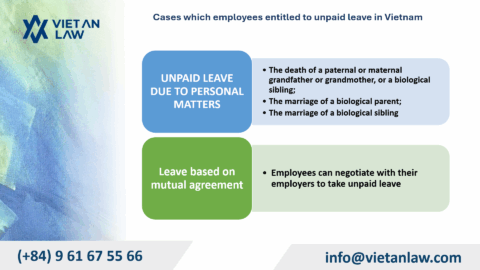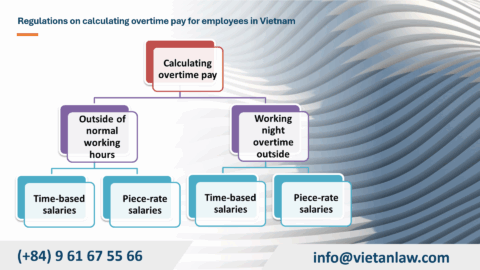The legal consequence after the unilateral termination of the labor contract from the employer is to reimburse costs related to benefits, salaries, and other income to the employee. So how is the compensation when the employer unilaterally terminates a labor contract in Vietnam? Viet An Law Firm will summarise this article below.
This is a unilateral legal act of the employer wishing to terminate the labor relationship. The employer wants to cancel the agreement, rights, and responsibilities with the employee for objective reasons or due to the employee’s fault.
Regardless of the above cause, the ultimate consequence is the termination of the labor relationship, the employer is released from the rights and responsibilities agreed upon in the labor contract. And unilaterally terminating a labor contract can cause the employer to suffer certain legal consequences.
When unilaterally terminating the labor contract according to the procedures for the employee, the employer:
In addition to the employer having to accept the employee back to work according to the contract, the employer must pay wages, health insurance, unemployment insurance, and severance pay for the employee’s working days are not allowed to work or must be compensated at least 02 months’ salary according to the previous labor contract.
Such income is the salary or other income that the employee deserves but has not received during the working process. Here, the employer must first be responsible for settlement and full payment.
According to Clause 3, Article 113 of the Labor Code2019, if the employee has not taken annual leave or has not taken all the days of annual leave, the employer must pay the employee annual leave and pay salary for days the employee has not yet taken leave.
According to Articles 46 and 47 of the Labor Code 2019, the working time to calculate severance pay and job loss benefits is the total time the employee worked for the employer minus the time the employee worked for the employer. Employees have participated in unemployment insurance and have been paid severance and job loss benefits by the employer during their working period.
The salary used to calculate severance pay and redundancy pay is the average salary for 6 consecutive months under the labor contract before the employee quits or loses his or her job.
According to Article 41 of the Labor Code 2019, employers are responsible for compensating and overcoming consequences according to regulations, specifically:
According to Clause 1, Article 41 of the Labor Code 2019, the employer must pay wages, social insurance, health insurance, and unemployment insurance during the days the employee is not allowed to work.
In addition, the employee must be paid an additional amount of money equal to at least 2 months’ salary according to the labor contract. After receiving it back, the employee must repay the employer the above benefits if received from the employer.
In case of violation of the provisions on the notice period, an amount corresponding to the salary according to the labor contract for the days without notice must be paid.
In addition to paying wages, social insurance, health insurance, and unemployment insurance must be paid during the days the employee is not allowed to work, and an additional amount of at least 02 months’ salary must be paid to the employee according to the contract. labor contract, the employer must pay a severance allowance according to the provisions of Article 46 of the Labor Code 2019 to terminate the labor contract.
The responsibility to take back workers is not reasonable, because in practice there are difficulties in applying it in some cases where the employer unilaterally terminates the labor contract on a reasonable basis. However, the notice period is violated or there are errors in implementing the order and procedures.
When a dispute occurs, especially when the dispute has to be resolved through litigation, the relationship between employees and employers has significant problems and cannot be reconciled. Furthermore, in cases where the unilateral termination of a labor contract is against the law in terms of process or notice period but is still valid, it means that the employer has a reasonable reason not to want the employee to continue to work. Therefore, continuing the relationship will no longer make sense.
If the employer is forced to accept the employee back to work, it is likely to cause an additional burden for the employer and affect the working environment, failing to achieve the goal in the spirit of the law. labor. In cases where due to natural disasters, epidemics, or war, the employer has tried every possible remedy but is still forced to narrow production and reduce workplaces, however, due to violation of the unilateral termination order of labor contracts that require the employer to take back the employee both create an additional burden for the employer and affect the rights of the employee.
The employer’s obligation to pay wages and pay related insurance during days when the employee is not allowed to work means increasing the employer’s compensation liability when unilaterally terminating the labor contract illegally. At the same time, it also helps ensure the restoration of workers’ rights.
However, the time to resolve disputes at Labor Arbitration or Court in our country is often a long period, and there are even cases where employees intentionally delay receiving the money mentioned above or due to objective reasons leading the lawsuit prolonged, typically during the Covid-19 pandemic in recent years.
Accordingly, the period the employee is not allowed to work that the employer must pay in cases brought to trial can last no less than one year. Forcing the employer to pay for this entire period is unreasonable and puts the employer at a disadvantage.
If you have any questions about labor law, labor contracts or corporate law in Vietnam, please contact Viet An Law Firm for our best support!




